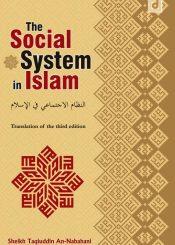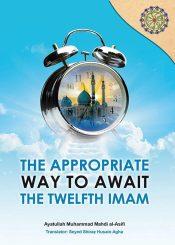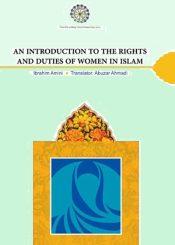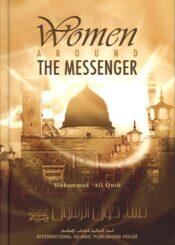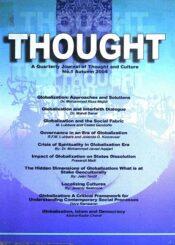Woman's Role in the Islamic Civilization
Woman's Role in the Islamic Civilization
0 Vote
423 View
By:Sayyid Sa'eed Akhtar Rizvi The previous pages reflected the Islamic thesis about woman and hijab. It is a conceptual view and a technical one. What about the practical view? How has woman, in the Islamic history, functioned in the society and what role has she actually played which shows the high position Islam awarded her when she left the superstitions and oppression of Jahiliyah behind her and donned the Islamic hijab? In the following pages, we will look at some practical confirmations of women who broke the chains of slavery and servitude of man and adopted worship of the One True God, Allah, Most High. Islam, itself, confirmed the wisdom of its laws in reality and they remain a beacon for guidance toward the way of a glorious life which is filled with goodness and firtility, offering virtue, glory and purity. Since the light of Islam rose in the land of Arabia, the Muslim woman shook off the dust of humiliation and enslavement and said farewell to the days of imprisonment and burying girls alive. She began to live the life designed by the revelation and laws of the Almighty Allah. She began to participate in building a glorious society which was observed by the Messenger of Allah (s.a.w.). Thus, humanity became enlightened to this new environment shinning with the light of prophethood. This way was first chosen by Khadijah bint Khuwailid, the leader of the believers' mothers. She offered all her wealth in order that the demands of the expenditure of Divine Da'wah (missionary work and propagation of the religion), would be met in its most severe and trying days of struggle with the idol worshippers of the Jahiliyah. In fact, the financial support of He Holiness Khadijah (a.s.), in those miserable circumstances, represented a keen weapon in that cruel struggle between guidance and misguidance. Indeed this honourable woman endured most of the material sufferings because of her continuous support for the call to truth and the call of the savior, Prophet Muhammad (s.a.w.); and her firm stand as a believer and a defender of the Message and the Messenger (s.a.w.). From the first day of da'wah she was at the side of the Messenger of Allah (s.a.w.) giving financial support, and more importantly, moral inspiration, love and affection to this 'Gift to Mankind'. She was the first to believe in him, defend him with her wealth and position, and gave him comfort and ease in some of his most trying times. The Commander of the Believers, Imam Ali (a.s.) refers to her position in one of his sermons found in Nahjul Balagha. He says: "...every year he (Prophet) used to stay is the cave of Hira for some time, and nobody used to be with him but I. None could then see or hear him or be near him but I During those days Islam was the religion of only the Prophet and his wife, Khadijah. I was the third of the trio. Nobody else is this world had accepted Islam. I even then used to see the divine light of revelation and smell the heavenly fragrance of prophethood..."[17][21] Other wives of the Holy Prophet of Allah (s.a.w.), after the death of Her Holiness Khadijah (a.s.), also achieved great ranks in history. We should not forget the role of Um-Salamah who memorized so many of the traditions of the Holy Prophet (s.a.w.). Her regard and obedience to truth and the right path is famous in the history of Muslims to the extent that some of the Imams of Ahlul-Bait (a.s.) deposited inheritances of the prophethood with her in difficult times. The active participation of women in the socio-political history of Islam is important. Among the first martyrs of Islam was Sommayah, mother of Yasser, who was brutally tortured and became actually the first martyr in Islam even before the migration to Medina. The participation and bravery of Muslim women of the past is seen on the pages of history. These heroic women possessed exalted personalities such as Sommayah. Their active participation in the religio-political movements is also a lesson to women all over the world urging them to regain their lost identity. One example of the power Islam gave to a woman's character from the early history is Nasibah who lived in Medina. She was an Ansar (helper of the immigrant from Mecca), and was known as Nasibah Jarahe. She was married and had two sons named Ammar and Abdallah. Her name first appears in the history of Aghabeh Bei'at. Here, new converts to Islam shook the Messenger's (s.a.w.) hand in an oath of allegiance. During this ceremony 60 men and two women from the Ansar converted to Islam. The Prophet of Allah (s.a.w.), who highly respected women, placed his hand in a dish of water and passed it to the women who in turn did the same. The government of the Prophet of Allah (s.a.w.) was aided by these people. Nasibah's husband was martyred in the Battle of Badr. One of her sons was also martyred at this time. This family, from the beginning of Islam in Medina, fought alongside the Holy Prophet (s.a.w.) against the infidels. History tells us that Nasibah took part in battles alongside Prophet Muhammad (s.a.w.) as a surgeon. She participated in many battles carrying a water skin upon her shoulders, treating the sick and injured in the burning deserts of Arabia. Nasibah, accompanied by her surviving son, Ammar, participated in the famous Battle of Uhud. When the Muslims suffered a setback, she carried her water skin giving relief to the thirsty and aiding the injured using her primitive surgical supplies. It is narrated from her that, "Amidst the fighting I saw my son running away. Stopping him I said, 'My child! Why are you running away? Who are you escaping from? From God or His Messenger?'" She then sent him back, while she herself watched from a distance. It was then that she suddenly noticed the Prophet of Allah (s.a.w.) being surrounded by the enemy. In a quick-witted move she and her son rushed to the Messenger of Allah (s.a.w.) and joined in the fight with the enemy. At this time one of the infidels martyred her son. It was here that Nasibah grabbed her son's sword and with the help of Divine Power, killed his assailant. The Holy Prophet (s.a.w) said to her, "Well done! May God's blessings be upon you Nasibah." This heroic woman received 13 wound during this battle, one of which was a sword wound on her neck. She lost a hand during the Yamamah War. It has been narrated that this dear self-sacrificing lady of Islam will return with the last Imam as a surgeon, God speed his appearance. Her Holiness Zainab (a.s.), the courageous daughter of Imam Ali (a.s.), played a great and most honourable role when she carried out her duty in conveying the message of her brother, Imam Husayn (a.s.), the grandson of the Messenger of Allah (s.a.w.), after his martyrdom in his everlasting revolution against the Ummayyad tyranny under the leadership of Yazid. She endured the task of explaining and conveying the aims and goals of Imam Husayn's (a.s.) great revolution in every meeting and gathering she attended. She disclosed the mask covering the black faces of the oppressors in Kufa, Damascus and Madina. She took the role and responsibility of protecting the prisoners of the family of the Messenger of Allah (s.a.w.), including women and children, who accompanied the severed head of Imam Husayn (a.s.) from Karbala's burning sands to Damascus, while suffering the greatest heartbreaks. Surely history bows its head in shame in front of this great woman to whom Islam and the oppressed are indebted for what she sacrificed, and for her resistance, patience and contributions in the way of truth. She stood bravely against the oppressors and expose their shameful deeds and policies. She brought the message of revolution , honour, dignity, and truth out of the desert into the cities. Her speeches in the courts of her captors of the most eloquent, biting and pointed nature. Indeed, she is famous for her attack against Yazid in his court in Damascus. She faced them all and accused them of their deeds without fear of execution or torture which was the daily and common practice against the enemies of the throne. She continued for the rest of her life to expose injustice and relay the message of her brother. She was a revolutionary fighter in her own right and held a high position of pure character and strength throughout her life. She was among the most honoured of people wherever she went. She kept the revolution of Imam Husayn (a.s.) and helped her society to realize their moral obligation and religious duty to fight tyranny and oppression. If we wish to investigate the pages of Islamic history, it is impossible for us to overlook the attitude of Hamidah, the wife of Imam Ja'far al-Sadiq (a.s.) and the mother of Imam Musa al-Kadhim (a.s.). She took care of the needy in Madina under the order of Imam al-Sadiq (a.s.). She used to distribute the wealth among the needy and visit the poor and offer them suitable material assistance. Another example of the most virtuous women who played a great role in our glorious Islamic history is Salil, the mother of Imam Hassan bin Ali al-Askari (a.s.). She played a vital role in defending truth and taking care of the Divine Guidance. This honourable woman represented a link between two Imams, Ali al-Hadi and Hasan al-Askari (a.s.) and the believers' bases during the difficulties which the two Imams faced from the tyrants of their times. She delivered the information and verdicts to the believers through her contact with their leaders. She presented their questions and information to the Imams (a.s.) concerning the movement of the believers and their situations. It is essential to remember that the participation of women in the political activities is very important. After all, women constitute, sometimes, more than half of every country's population and can change the destiny of a society for the better or worse depending on the extent of their political awareness and participation. Hijab in no way hinders this participation as it did not hinder any of the women whose examples we have mentioned. A modern day example of this awareness and participation was seen in the heat of the Islamic Revolution in Iran. With their babies in their arms, and young children by their sides, women protested against the tyrannical regime and were shot by the Shah's police. Several mothers and their children were martyred during those demonstrations. As the message of truth rose, and the voice of Revolution is heard once again in the 20th Century, we see the women of Palestine, with tightened fists shaking in the faces of Zionist soldiers, rocks and stones in the other hand waiting for a chance to hit their targets. Today, these women and women like them all over the world are considered to be the cornerstone of this revolution. Hijab is their banner and they are proud of their position as the freedom fighters against the biggest enemy of truth. We can see the effect that Islam has on the general public and hijab on the women by recent examples in Azarbaijan and Bosnia-Herzegovnia. Islam has renewed itself among them and it has given them the courage and power to withstand the tyranny that plagues them. For many, Islam was removed from their culture by communism and socialism. They call themselves Muslims but they were, for the most part, ignorant of Islam's laws. When they gained their independence from these anti-human, anti-God systems, they moved toward the light of truth and regained what they had lost. One of the first signs of this was the hijab of the women. These examples give imagination to what can be achieved by Muslim women who follow Islamic principles and laws. They show the great role in the life of people and the human experiment that she plays, contradicting those miserable imaginations and opinions stirred up by the ignorant concerning Islam and its unique ability in smashing the shackles obstructing Muslim women from performing their great legal responsibilities under the shadow of dynamic Islamic progress. Notes: [18][21] Nahj al-Balagha, Sermon No, 192. [13][17] Man and Religion, English version, 1st ed., p,81, Al-Balagh Foundation quoting from a bulletin by Al-Iskanadariah University. [14][18] Ibid., p.82. [15][19] Ibid., p,84. [16][20] Ibid. Source: alhassanain.com
